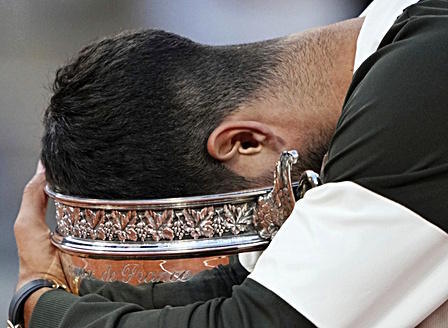There was a day when Carlos Alcaraz stopped being the kid who dreamed of himself in Paris, biting a huge trophy like his idol, to become a tennis legend. It was June 8, 2025. The future will frame his achievements, currently five Grand Slam titles at 22, but will remember first his miracle in that Roland Garros final, the final of all time, the longest final in the venue's history. The certainty of being capable of anything led him to an impossible feat, coming back from two sets down, saving three match points, to celebrate his second consecutive title.
His generational rival, Jannik Sinner, presented an evolution from the lab, a better game, better physical condition, a better mentality, and yet fell to him in an astonishing 4-6, 6-7(4), 6-4, 7-6(3), and 7-6(2) match setting a new record of five hours and 29 minutes of play. Regardless of the outcome, both sang an ode to the beauty of tennis and its inclination towards eternity. It won't be a consolation; Sinner will need many hours of psychological work, but the rivalry between them now has its iconic match. Was it better than the 2008 Wimbledon final between Rafa Nadal and Roger Federer? It will depend on each individual, where they experienced it, how they experienced it, with whom they experienced it.
The Musketeers' Cup decided in a super tie-break: any comparison demands reflection. The outcome was marvelous, with amazement in every stroke, the level of play of two superhumans. There, in that sudden death, after all the suffering, after saving themselves from defeat countless times, Alcaraz emerged victorious thanks to his forehand. That shot that comes from within effortlessly, as if it were captive inside him waiting for its release. The Philippe Chatrier trembled with its outbursts, and spectators were enthralled as crucial points were won. 1-0, 2-0, 3-0. Sinner had also risen from several falls, but from that one, he couldn't. The champion remains Alcaraz.
And for how long. Because Sinner can rightfully proclaim that he did everything he could. Throughout the match, he was a metronome at full speed, 'allegro prestissimo con fuoco,' tic, tic, tic, tic, tic, tic, shots here and shots there from the baseline. In his adaptation to clay, he now knows how to step back and play from defense. In his adaptation to clay, he can endure over three hours, and four, and five. In his adaptation to clay, he can get as close as possible to victory. But he will need more, something more, it's impossible to know what.
There was an incident that marked the first part of the match, a triviality, a nonsense. In the first set, the wind lifted clay particles, and one got into Alcaraz's right eye, distracting him, cooling him down, almost leading him to give up the match. Right after the annoyance, he conceded a break that cost him that initial set, and in the second set, with another break, he almost surrendered. If he didn't, if he endured more, it was due to his conviction that he could still do it and an unimaginable support from Nadal. The Paris crowd lifted him with their chants. Yes, the Paris crowd. "Carlos, Carlos, Carlos!" And he, as emotional as he is, forced a tie-break that Sinner won, seemingly sealing the match. Two to zero. Two sets to zero.
From that moment on, only the miracle remained. Who could believe it? Alcaraz's friends who had traveled from El Palmar chanted, "Yes, you can, Yes, you can!" But statistics hit them in the face. Throughout his career, the Spaniard had started a match two sets down on eight occasions and had never come back. Only five times in history had there been a turnaround like that in a final, and it had always been due to the favorite's collapse. The last one, Djokovic's triumph over Tsitsipas in 2021. Alcaraz needed Sinner to falter first and then collapse, but that didn't happen.
For the books, for eternity, his reaction will remain. Instead of accepting defeat, in the third set, he took advantage of his opponent's worst play - touching two balls with the frame of the racket - to minimize his disadvantage, and in the fourth set, he resurrected with precision. With a 5-3 lead, Sinner had three opportunities to close the game, the match, and the tournament, but he didn't capitalize on them. That's when the match definitively changed. Alcaraz, with the confidence that he could do it, won the tie-break with two aces to the line, and in the fifth set, the madness, the unprecedented.
After losing his lead, the Italian could have accepted his fate and given up. In fact, he started with a break against him, but he fought back. Even though Alcaraz felt the ball like never before, delivered drop shots one after another, enjoyed amidst the suffering, he continued with his rhythm from side to side. In fact, possibly the most beautiful point of the entire match was his delicate drop shot that captivated the fans. With his resilience, he reached the super tie-break, that super tie-break, the decisive super tie-break. At the end, both exhausted sat in their benches for a few minutes, absorbed. What had just happened? One of the best episodes in tennis history, the comeback of all time, the epic start of a rivalry between Alcaraz and Sinner promising years of spectacle.
